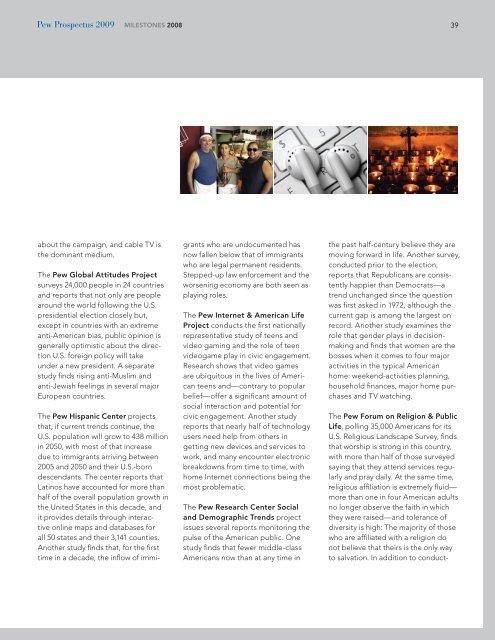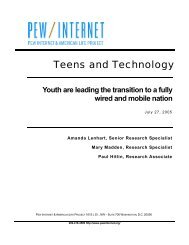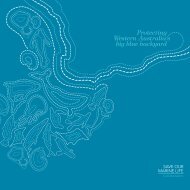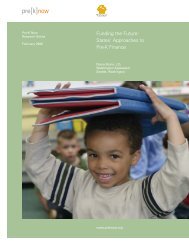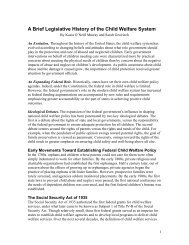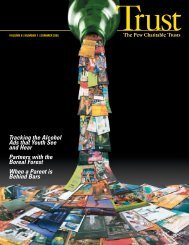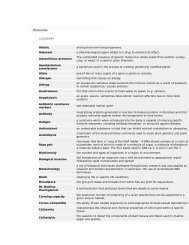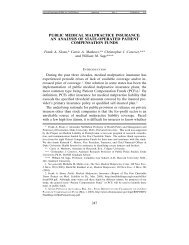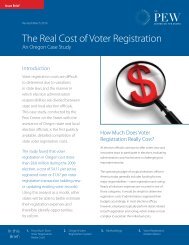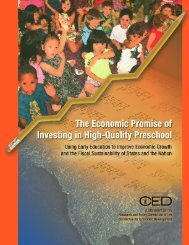PROSPECTUS - The Pew Charitable Trusts
PROSPECTUS - The Pew Charitable Trusts
PROSPECTUS - The Pew Charitable Trusts
Create successful ePaper yourself
Turn your PDF publications into a flip-book with our unique Google optimized e-Paper software.
<strong>Pew</strong> Prospectus 2009 milestones 2008 39<br />
about the campaign, and cable TV is<br />
the dominant medium.<br />
<strong>The</strong> <strong>Pew</strong> Global Attitudes Project<br />
surveys 24,000 people in 24 countries<br />
and reports that not only are people<br />
around the world following the U.S.<br />
presidential election closely but,<br />
except in countries with an extreme<br />
anti-American bias, public opinion is<br />
generally optimistic about the direction<br />
U.S. foreign policy will take<br />
under a new president. A separate<br />
study finds rising anti-Muslim and<br />
anti-Jewish feelings in several major<br />
European countries.<br />
<strong>The</strong> <strong>Pew</strong> Hispanic Center projects<br />
that, if current trends continue, the<br />
U.S. population will grow to 438 million<br />
in 2050, with most of that increase<br />
due to immigrants arriving between<br />
2005 and 2050 and their U.S.-born<br />
descendants. <strong>The</strong> center reports that<br />
Latinos have accounted for more than<br />
half of the overall population growth in<br />
the United States in this decade, and<br />
it provides details through interactive<br />
online maps and databases for<br />
all 50 states and their 3,141 counties.<br />
Another study finds that, for the first<br />
time in a decade, the inflow of immigrants<br />
who are undocumented has<br />
now fallen below that of immigrants<br />
who are legal permanent residents.<br />
Stepped-up law enforcement and the<br />
worsening economy are both seen as<br />
playing roles.<br />
<strong>The</strong> <strong>Pew</strong> Internet & American Life<br />
Project conducts the first nationally<br />
representative study of teens and<br />
video gaming and the role of teen<br />
videogame play in civic engagement.<br />
Research shows that video games<br />
are ubiquitous in the lives of American<br />
teens and—contrary to popular<br />
belief—offer a significant amount of<br />
social interaction and potential for<br />
civic engagement. Another study<br />
reports that nearly half of technology<br />
users need help from others in<br />
getting new devices and services to<br />
work, and many encounter electronic<br />
breakdowns from time to time, with<br />
home Internet connections being the<br />
most problematic.<br />
<strong>The</strong> <strong>Pew</strong> Research Center Social<br />
and Demographic Trends project<br />
issues several reports monitoring the<br />
pulse of the American public. One<br />
study finds that fewer middle-class<br />
Americans now than at any time in<br />
the past half-century believe they are<br />
moving forward in life. Another survey,<br />
conducted prior to the election,<br />
reports that Republicans are consistently<br />
happier than Democrats—a<br />
trend unchanged since the question<br />
was first asked in 1972, although the<br />
current gap is among the largest on<br />
record. Another study examines the<br />
role that gender plays in decisionmaking<br />
and finds that women are the<br />
bosses when it comes to four major<br />
activities in the typical American<br />
home: weekend-activities planning,<br />
household finances, major home purchases<br />
and TV watching.<br />
<strong>The</strong> <strong>Pew</strong> Forum on Religion & Public<br />
Life, polling 35,000 Americans for its<br />
U.S. Religious Landscape Survey, finds<br />
that worship is strong in this country,<br />
with more than half of those surveyed<br />
saying that they attend services regularly<br />
and pray daily. At the same time,<br />
religious affiliation is extremely fluid—<br />
more than one in four American adults<br />
no longer observe the faith in which<br />
they were raised—and tolerance of<br />
diversity is high: <strong>The</strong> majority of those<br />
who are affiliated with a religion do<br />
not believe that theirs is the only way<br />
to salvation. In addition to conduct-


